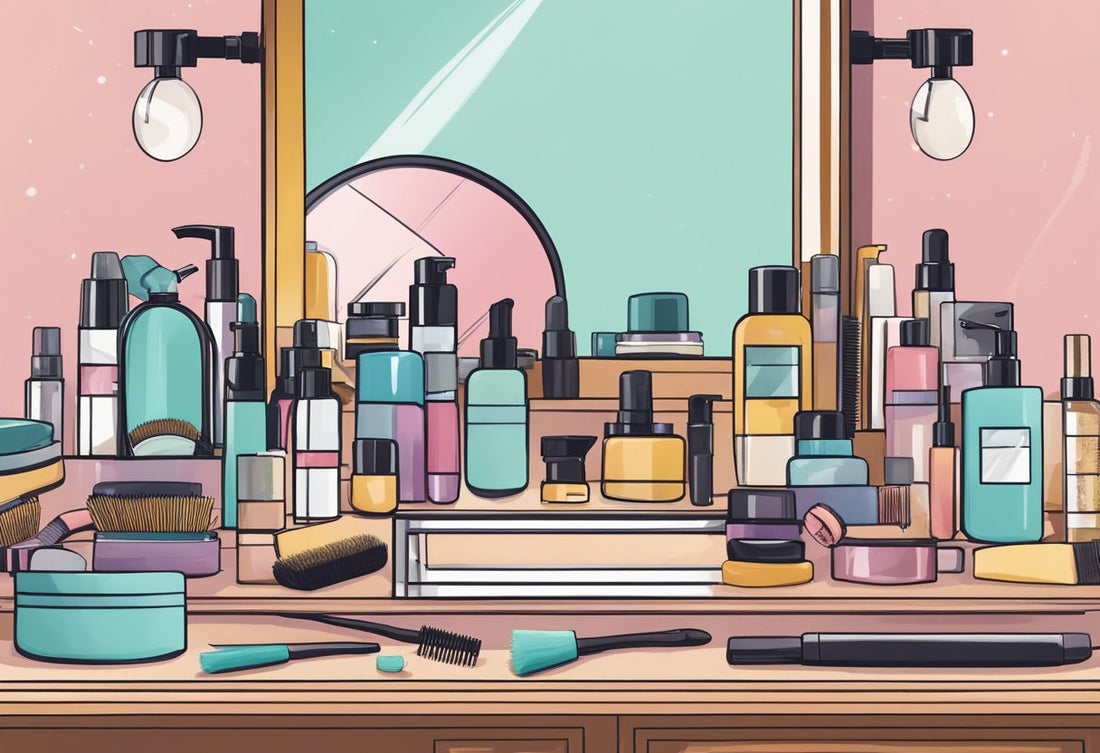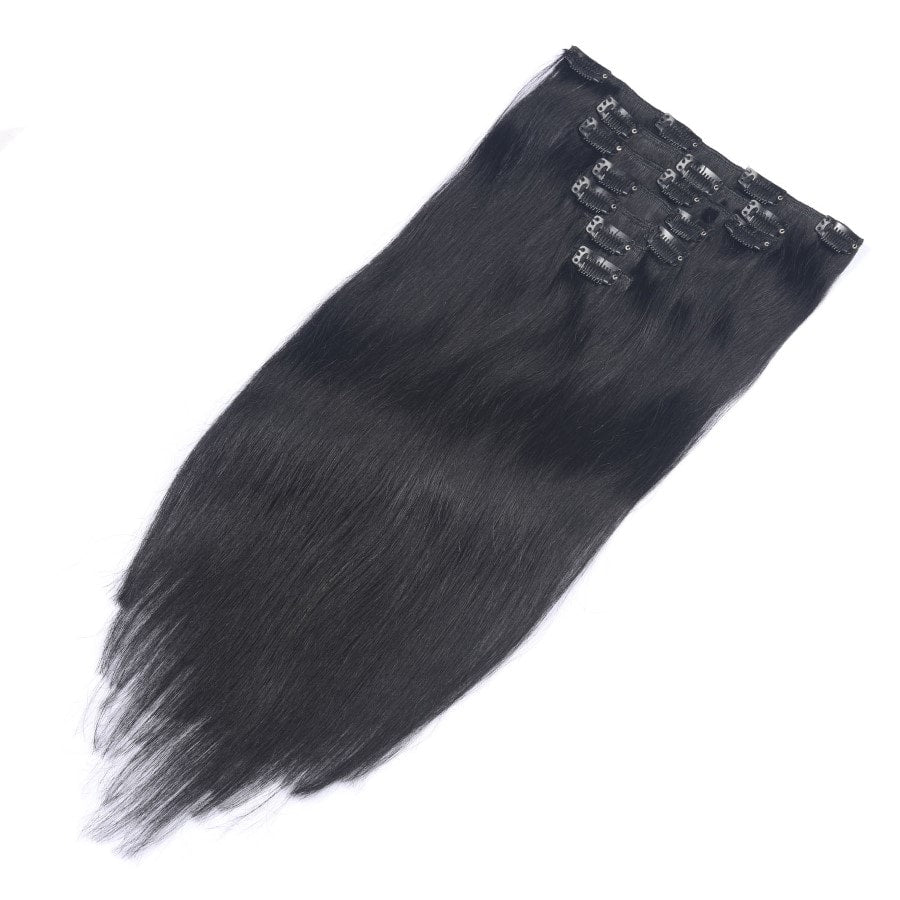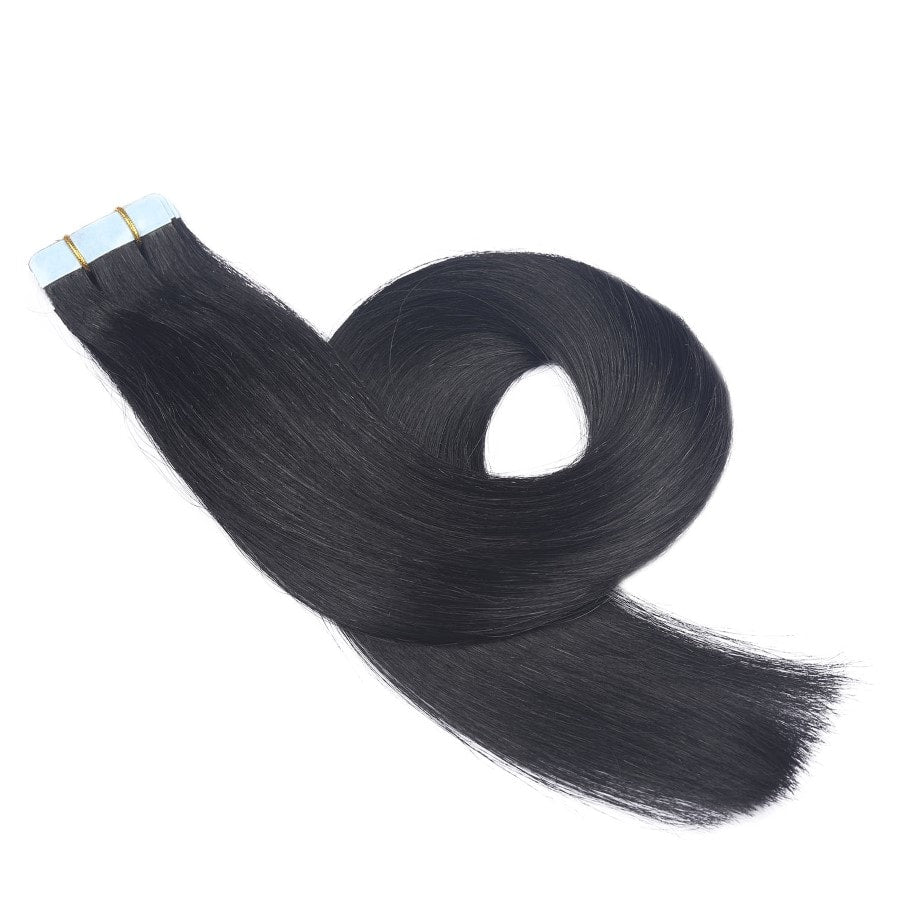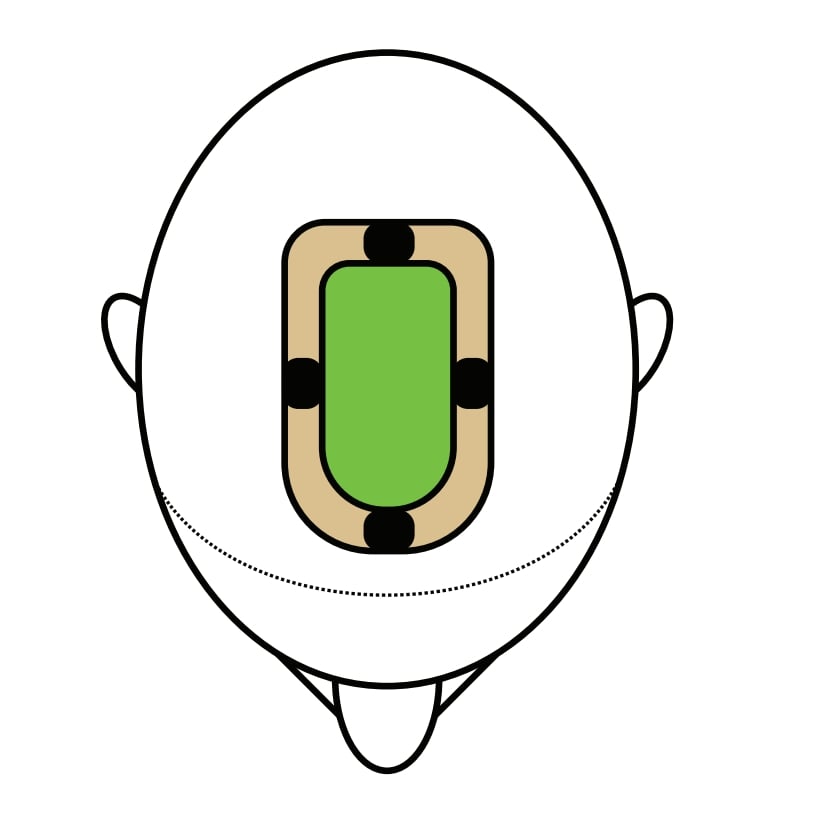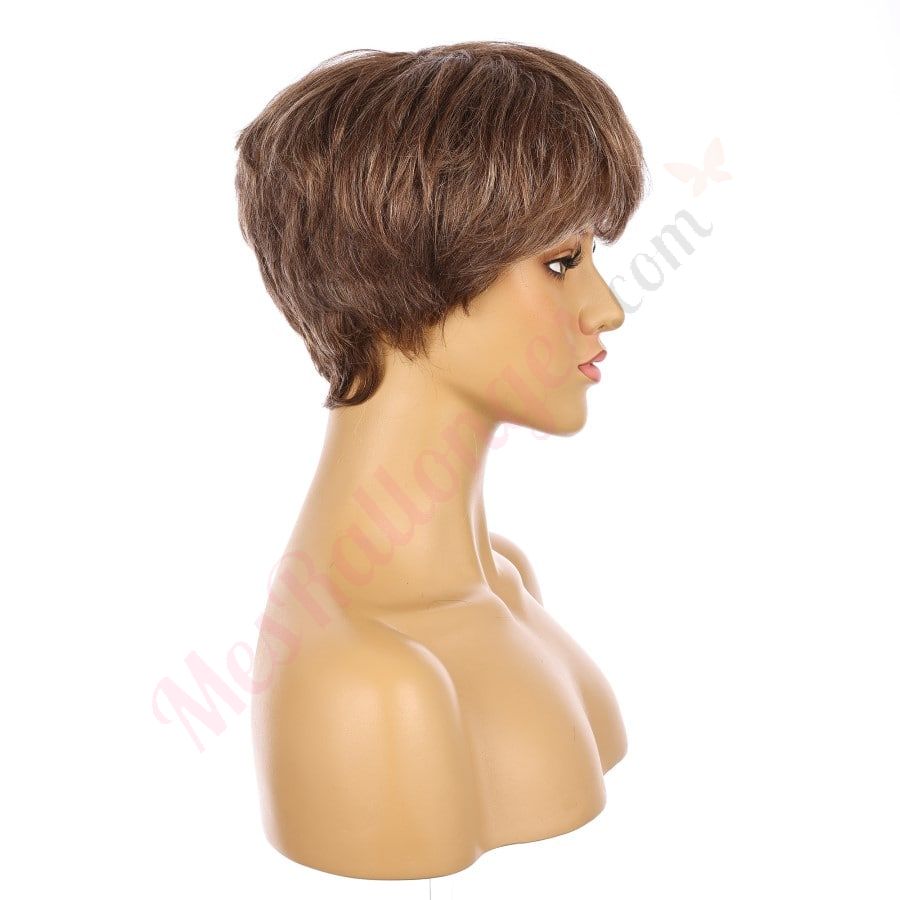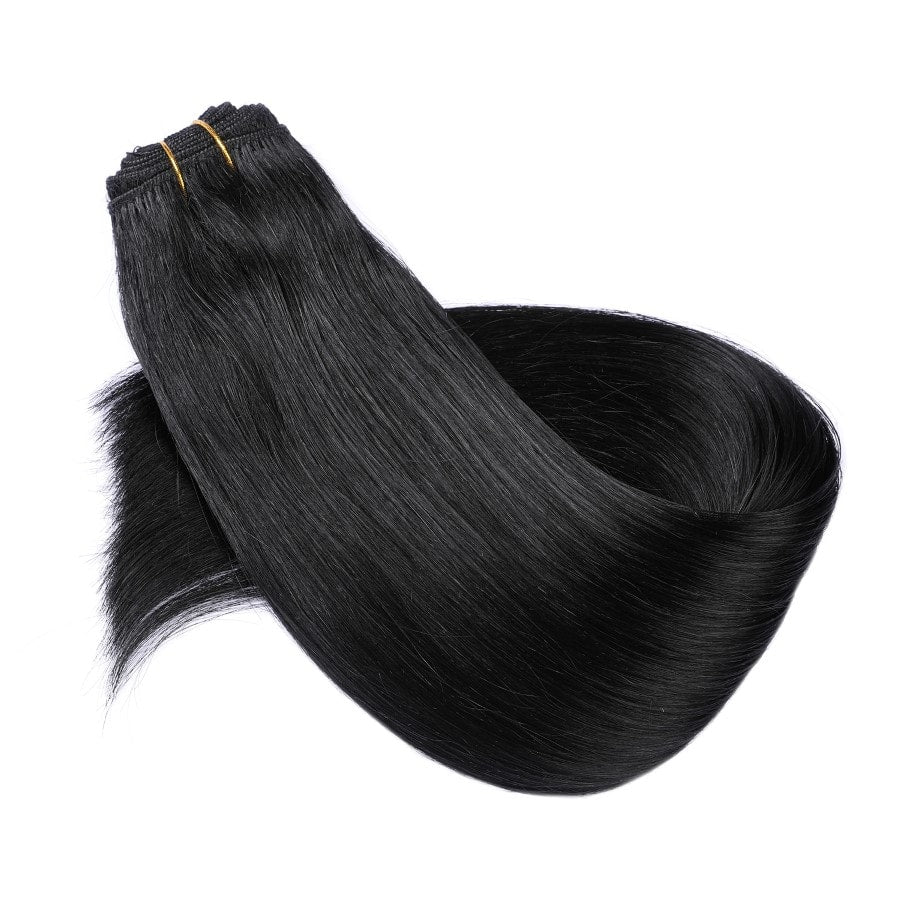Beaucoup d'entre nous aiment le glamour instantané que procurent les extensions de cheveux. Elles transforment notre look, ajoutent du volume, de la longueur et même une touche de couleur. Mais lorsque nos extensions de cheveux deviennent crépues, elles peuvent certainement atténuer notre enthousiasme. Les frisottis dans les extensions de cheveux peuvent résulter de plusieurs facteurs, mais ne vous inquiétez pas, nous sommes là pour vous aider à comprendre pourquoi cela se produit et comment y mettre fin.
Nos extensions de cheveux peuvent devenir crépues en raison d'un entretien inapproprié ou de l'utilisation de produits inadaptés. Pour les extensions synthétiques, ne pas utiliser de revitalisants sans rinçage spécialement conçus pour elles peut entraîner une sécheresse. Les extensions de cheveux humains ont besoin d'un peu plus d'attention, comme un brossage régulier et l'utilisation de traitements hydratants. Nous pouvons prévenir et gérer les frisottis en adoptant les bonnes pratiques de soins capillaires.
Découvrons ensemble les étapes à suivre pour garder nos extensions de cheveux lisses et soyeuses. Qu'il s'agisse d'un remède maison ou de la sélection des meilleurs produits, il existe toujours une solution pour garder ces extensions fabuleuses !
Principaux points à retenir
- Soins appropriés et les bons produits aident à éviter les frisottis dans les extensions de cheveux.
- Un entretien régulier et des soins hydratants sont indispensables.
- Des remèdes maison et des conseils professionnels peuvent garder les extensions lisses et élégantes.
Comprendre les frisottis dans les extensions de cheveux
Nos extensions de cheveux peuvent parfois devenir crépues et sèches, ce qui provoque de la frustration. Cela se produit pour plusieurs raisons, et savoir pourquoi peut nous aider à mieux le gérer. Nous explorerons les causes des frisottis et comment extensions de cheveux humains et synthétiques réagir différemment.
Causes des frisottis et de la sécheresse
Les extensions de cheveux crépus manquent souvent d'hydratation. Lorsque nos extensions n'en reçoivent pas assez L'hydratation est insuffisante, les cheveux sont rugueux et indisciplinés. L'utilisation d'outils chauffants comme des fers à lisser ou à boucler sans protection peut également endommager nos extensions, les rendant sèches et crépues.
Les facteurs environnementaux jouent également un rôle important. L'exposition au soleil, au vent et à l'humidité déshydrate nos extensions. De plus, une mauvaise méthodes de lavage et de séchage enlève les huiles naturelles, laissant les extensions de cheveux cassantes.
L’utilisation de produits inadaptés est également à l’origine de ce problème. Les shampoings et après-shampoings classiques pour cheveux naturels peuvent ne pas convenir aux extensions. Les produits contenant des sulfates et de l’alcool peuvent entraîner une sécheresse et des frisottis.
Distinguer les cheveux humains des cheveux synthétiques
Les extensions de cheveux humains ont tendance à se comporter comme nos cheveux naturels. Elles peuvent devenir crépues et sèches si nous n'en prenons pas soin correctement. Les extensions de cheveux humains bénéficient de traitements et de produits conçus pour les cheveux naturels, notamment des après-shampooings et des sérums qui restaurent l'hydratation.
Les extensions de cheveux synthétiques réagissent différemment. Elles ont plus tendance à fondre lorsqu'elles sont exposées à la chaleur et les produits classiques peuvent ne pas être efficaces. Il est donc préférable d'utiliser des produits spécialement formulés pour les cheveux synthétiques, comme les après-shampooings sans rinçage pour cheveux synthétiques.
Savoir si nos extensions sont humaines ou synthétiques nous aide à choisir les bonnes méthodes d'entretien. extensions synthétiques nécessitent moins d'entretien, ils ont besoin de produits spécifiques pour rester en bonne forme. Les extensions de cheveux humains, bien que plus cher , nous permet plus de flexibilité avec le style.
Routine essentielle de soins capillaires

Prendre soin de nos extensions de cheveux est essentiel pour conserver leur douceur et leur éclat . Nous nous plongerons dans les techniques de lavage appropriées, l'importance du conditionnement et la façon dont un conditionnement en profondeur peut restaurer et rajeunir.
Bien laver vos extensions
Lors du lavage de nos extensions de cheveux, il est essentiel d'utiliser un Shampoing sans sulfate . Les sulfates peuvent priver les cheveux de leurs huiles naturelles, les laissant secs et crépus. Nous devons faire mousser doucement le shampoing dans nos mains avant de l'appliquer.
Utilisez de l’eau tiède pour rincer soigneusement le shampooing.
À Pour éviter les nœuds , lavez et rincez toujours les extensions en effectuant des mouvements vers le bas. Après le lavage, séchez les extensions avec une serviette douce et évitez de les essorer ou de les tordre.
Le séchage à l'air libre est préférable car la chaleur peut être dommageable.
Le rôle du conditionnement
Le soin est essentiel pour garder nos extensions douces et faciles à coiffer. Nous devons appliquer une quantité généreuse de soin du milieu de la longueur jusqu'aux pointes des cheveux. Le soin de la zone des racines peut provoquer un glissement, alors concentrez-vous plutôt sur la longueur.
Laissez agir l’après-shampoing pendant au moins 5 minutes avant de rincer.
L’utilisation d’un après-shampooing sans rinçage peut apporter une hydratation et une protection supplémentaires.
Nous devrions rechercher des produits spécifiquement conçus pour les extensions de cheveux, car ils sont formulés pour fournir les nutriments et les soins dont nos extensions ont besoin.
Conditionnement en profondeur pour la restauration
Les traitements de conditionnement en profondeur sont une bouée de sauvetage pour les peaux sèches et extensions de cheveux crépus . Nous devrions intégrer cette étape à notre routine une fois par semaine. Utilisez un masque revitalisant en profondeur riche en nutriments pour restaurer l'hydratation et la brillance.
Appliquez généreusement le masque en veillant à recouvrir chaque mèche.
On peut ensuite envelopper les extensions dans une serviette chaude pour aider le produit à pénétrer en profondeur. Après environ 20 minutes, rincer abondamment à l'eau froide.
De plus, l’ajout d’un peu d’huile de coco vierge ou d’huile d’argan peut apporter un regain supplémentaire d’hydratation et de douceur.
En s'en tenant à cela Routine de soins capillaires essentielle , nos extensions resteront belles, douces et sans frisottis !
Techniques de coiffure qui minimisent les dommages
En adoptant En pratiquant un démêlage doux , en comprenant les effets du coiffage à chaud et en choisissant entre le séchage à l'air libre et le séchage au sèche-cheveux, nous pouvons garantir que nos extensions de cheveux restent belles et saines.
Pratiques de démêlage doux
Démêler correctement nos extensions de cheveux peut éviter de nombreux dommages. Utiliser un peigne à dents larges est fortement recommandé car il aide à éliminer les nœuds sans provoquer de casse.
En commençant par les pointes et en remontant jusqu'aux racines, vous minimisez les tiraillements et le stress sur les cheveux. Brosser les extensions régulièrement , mais avec soin, les maintient lisses et évite la formation de nœuds.
Évitez de tirer ou de tirer sur les cheveux , car cela peut fragiliser la structure du cheveu. De plus, l'utilisation d'un après-shampoing sans rinçage peut faciliter le démêlage et protéger les cheveux pendant le démêlage.
Le casse-tête du coiffage à chaud
Les outils de coiffure chauffants, comme les fers à lisser et à friser, peuvent causer de graves dommages s'ils ne sont pas utilisés correctement. utilisez toujours un spray protecteur contre la chaleur avant d'appliquer de la chaleur.
Optez pour le réglage de chaleur le plus bas qui vous permettra d'obtenir le style souhaité. Une chaleur élevée peut éliminer l'humidité et entraîner des frisottis et des cassures.
Limitez au maximum les appareils chauffants pour maintenir des extensions saines. L'utilisation excessive de ces outils peut rendre les cheveux secs et cassants. Nous devrions explorez les options de coiffage sans chaleur , comme le tressage ou l'enroulement, pour des boucles et des ondulations sans dommage.
Séchage à l'air libre ou au sèche-cheveux
Choisir entre le séchage à l'air libre et le séchage au sèche-cheveux est crucial pour l'entretien des extensions. Le séchage à l'air libre est l'option la plus douce , car il n'expose pas les cheveux à la chaleur, ce qui peut dégrader leur qualité au fil du temps.
Lors du séchage à l'air, nous pouvons délicatement tapotez les extensions avec une serviette pour éliminer l'excès d'eau mais évitez de frotter, ce qui peut provoquer des enchevêtrements.
Le séchage au sèche-cheveux, si nécessaire , doit être effectué à basse température ou à froid. accessoire diffuseur peut aider à répartir la chaleur plus uniformément et à réduire le risque de dommages. Gardez toujours le sèche-linge en mouvement pour éviter de concentrer la chaleur sur un seul endroit pendant trop longtemps.
Choisir les bons produits

Pour que nos extensions de cheveux restent lisses et sans frisottis, il est essentiel de choisir les bons produits. Les points les plus importants à prendre en compte sont l'utilisation de shampoings sans sulfate et l'incorporation d'huiles et de sérums nourrissants.
Le sans sulfate est la voie à suivre
Nous devrions toujours choisir sans sulfate shampoings et après-shampoings pour nos extensions de cheveux. Les sulfates peuvent être agressifs et éliminer les huiles naturelles, laissant nos extensions sèches et crépues. Sans les huiles naturelles, les cheveux perdent leur brillance et leur douceur.
L'utilisation de produits sans sulfate permet de conserver l'hydratation et de garder les cheveux doux. Les marques indiquent souvent qu'ils sont sans sulfate, alors assurez-vous de vérifier les étiquettes. Nous devons également éviter d'utiliser des shampooings agressifs contenant des sulfates ou d'autres détergents puissants.
Le pouvoir des huiles et des sérums
Huiles nourrissantes comme huile de coco et huile d'argan sont fantastiques pour garder nos extensions hydratées. L'application d'une petite quantité de ces huiles peut aider à réduire les frisottis et à ajouter de la brillance.
Huile pour cheveux Les sérums sont également essentiels. Ils retiennent l'humidité et protègent les extensions des dommages environnementaux. Nous devons utiliser régulièrement un après-shampooing sans rinçage pour maintenir la douceur et la maniabilité de nos extensions. Recherchez des produits contenant glycérine car cela aide à attirer l'humidité dans les cheveux.
Lorsqu'ils sont appliqués correctement, ces produits garantissent que nos extensions de cheveux soient belles et durent plus longtemps.
Style de vie et soins des extensions de cheveux
Nos routines et habitudes quotidiennes ont un impact important sur la façon dont nos extensions de cheveux restent lisses et brillantes. En apportant quelques changements simples à notre mode de vie et en prenant soin de nos extensions de cheveux correctement, nous pouvons les garder en parfait état.
Protection contre les facteurs de stress environnementaux
Les extensions de cheveux sont sensibles aux facteurs de stress environnementaux tels que l'exposition au soleil, l'eau dure et les éléments agressifs. Lorsque nous sommes au soleil, le port d'un chapeau ou l'utilisation d'un spray protecteur UV peut aider à protéger nos extensions de cheveux des dommages causés par les UV. Eau dure L'eau dure peut assécher les cheveux et les rendre secs et crépus. L'installation d'un filtre de douche peut aider à réduire l'impact de l'eau dure. De plus, couvrir nos cheveux avec un foulard ou un chapeau par temps venteux ou froid peut prévenir les dommages causés par les éléments agressifs.
Nutrition et santé des cheveux
Une bonne nutrition est essentielle pour garder nos extensions de cheveux et nos cheveux naturels en bonne santé. Une alimentation équilibrée, riche en vitamines et minéraux, en particulier ceux comme la biotine, la vitamine E et les acides gras oméga-3, favorise la force et la brillance des cheveux. Boire beaucoup d'eau maintient nos cheveux hydratés de l'intérieur. De plus, l'application de huiles naturelles L'ajout d'huile de coco ou d'huile d'argan à nos extensions de cheveux peut apporter une nutrition supplémentaire. Ces huiles aident à garder nos extensions douces et faciles à coiffer. Un simple masque DIY à base d'huile de coco et de miel peut faire des merveilles pour hydrater et revitaliser nos extensions.
Entretien et maintenance professionnels
Un entretien approprié et des visites régulières en salon garantissent que vos extensions de cheveux restent fraîches et lisses. Savoir quand remplacez vos extensions garde également votre look soigné et prévient les dommages.
Visites régulières au salon
Visites régulières chez un professionnel salon de coiffure sont essentiels pour garder nos extensions en parfait état. Les salons proposent des traitements spécialisés qui améliorent la durabilité et qualité de nos extensions de cheveux.
Lors de ces visites, les coiffeurs peuvent proposer des soins comme un soin revitalisant en profondeur, qui hydrate et lisse les extensions. Les coiffeurs professionnels ont également les connaissances nécessaires pour manipuler et coiffer les extensions. Extensions de cheveux Remy , garantissant qu'elles conservent leur aspect naturel.
Garniture est un autre service essentiel. Une coupe fréquente évite les pointes fourchues, gardant les extensions fraîches et saines. Les professionnels du salon peuvent également détecter les premiers signes d'usure et fournir des conseils d'experts sur la façon de prolonger la durée de vie de nos extensions.
Quand remplacer vos extensions
Connaître le bon moment pour remplacer nos extensions de cheveux permet d'éviter d'endommager à la fois les extensions et nos cheveux naturels. Des extensions de cheveux de haute qualité comme Extensions de cheveux Remy peuvent durer plus longtemps, mais même eux doivent être remplacés éventuellement.
Signes Les raisons pour lesquelles nos extensions doivent être remplacées sont les frisottis, les nœuds et la perte de brillance. Si nous remarquons des nœuds ou si les extensions semblent sèches et cassantes, il est temps d'envisager d'en acheter de nouvelles.
Le remplacement est essentiel pour conserver un aspect soigné. Des mises à jour régulières garantissent que nos extensions se marient parfaitement avec nos cheveux naturels, offrant un look naturel et attrayant. Investir dans extensions de cheveux de haute qualité garantira à nouveau des résultats plus durables et plus beaux.
Traitements à domicile et solutions DIY

Découvrons quelques excellents traitements maison pour les extensions de cheveux crépus. Nous aborderons les masques et remèdes faits maison, ainsi que les moyens de maintenir les niveaux d'hydratation.
Masques et remèdes maison
Un traitement étonnant pour les extensions de cheveux crépus est un Masque à l'huile de coco . L'huile de coco est riche en acide laurique, qui contribue à hydrater et à réduire la perte de protéines. Il suffit d'en appliquer une petite quantité sur nos extensions et de la laisser reposer pendant environ 30 minutes avant de rincer.
Un autre excellent remède est utilisé Avocat et miel . Écrasez un avocat mûr et mélangez-le avec deux cuillères à soupe de miel. Appliquez ce mélange sur les extensions de cheveux et laissez agir 20 minutes avant de les rincer. Ce masque offre un soin en profondeur, grâce aux propriétés nourrissantes de l'avocat et aux effets hydratants du miel.
Pour ceux qui recherchent une solution rapide, essayez Spray d'eau sucrée . Mélangez une cuillère à café de sucre granulé avec une tasse d'eau. Vaporisez-le légèrement sur les pointes de nos extensions pour ajouter un peu de tenue et réduire les frisottis. N'en faites pas trop, car trop de sucre peut rendre les cheveux raides.
Maintenir les niveaux d'humidité
Garder nos extensions de cheveux hydratées est essentiel pour prévenir les frisottis. Soins à l'huile chaude sont fantastiques pour cela. Nous pouvons réchauffer un peu d'huile de coco ou d'huile d'olive et l'appliquer sur les extensions, en la laissant pénétrer pendant 15 à 20 minutes avant de rincer.
En utilisant un revitalisant sans rinçage Les revitalisants spécialement conçus pour les extensions de cheveux synthétiques ou humains peuvent également faire une grande différence. Ces revitalisants aident à retenir l'humidité et à protéger les cheveux du dessèchement.
N'oubliez pas de couper les extrémités de nos extensions tous les deux ou trois mois. Des coupes régulières permettent d'éliminer les pointes sèches ou abîmées, pour que les extensions restent lisses et saines.
Enfin, évitez toujours les coiffures trop chaudes et utilisez un spray protecteur de chaleur lorsque vous le faites. Cela évitera une sécheresse supplémentaire et gardera vos extensions dans la meilleure forme possible.
Questions fréquemment posées
Vous souhaitez en savoir plus sur les extensions de cheveux crépus ? Répondons ensemble à quelques questions courantes.
Comment redonner de l'éclat à mes extensions de cheveux devenues ternes ?
Nous pouvons restaurer la brillance de nos extensions de cheveux en quelques étapes simples !
Tout d’abord, nous devons choisir un bon après-shampoing sans rinçage conçu spécifiquement pour notre type d’extensions de cheveux. Cela permet d’ajouter de l’humidité et de réduire les frisottis.
Ensuite, brossez doucement nos extensions pour éliminer les nœuds.
Nous pouvons également envisager d’utiliser une huile légère comme l’huile d’argan pour ajouter de la brillance sans provoquer d’accumulation. Quelques gouttes peuvent faire une énorme différence !
N'oubliez pas de minimiser l'utilisation d'outils de coiffure chauffants, car une chaleur excessive peut dessécher nos extensions de cheveux, les rendant plus crépues.
Enfin, laisser nos extensions sécher à l’air libre naturellement plutôt que d’utiliser des sèche-cheveux peut aider à maintenir leur douceur et leur brillance.

